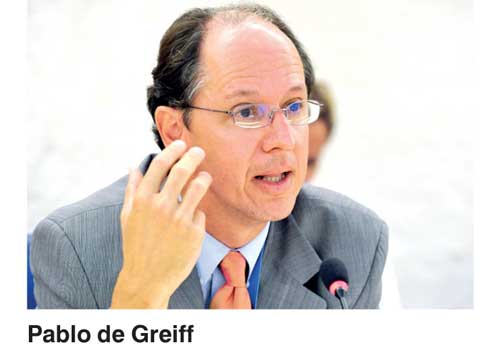Saturday Feb 28, 2026
Saturday Feb 28, 2026
Thursday, 12 October 2017 00:26 - - {{hitsCtrl.values.hits}}
At the invitation of the Sri Lankan Government, the UN Special Rapporteur on the Promotion of Truth, Justice, Reparation and Guarantees of Non-Recurrence, Pablo de Greiff, is currently on an official visit to Sri Lanka from 10-23 October, the Foreign Affairs Ministry said in a statement.
During the visit, the Special Rapporteur is scheduled to meet with ministers and Members of Parliament, Government officials at the central and provincial levels, civil society, religious leaders, academics and representatives of the international community in Sri Lanka. He will travel to Trincomalee, Mannar, Anuradhapura, Jaffna, Kilinochchi, Vavuniya, Kandy and Matara.
He will deliver two public lectures, one in Jaffna and one in Colombo, and address the media at the conclusion of his visit on 23 October, following the practice of all special rapporteurs with respect to country visits.
As required of special rapporteurs, he will present a report on his visit to the Human Rights Council, in September 2018.
Successive governments in Sri Lanka have been inviting such special rapporteurs to the country to obtain their views and expert advice on specific thematic areas. Governments are not bound by the advice or recommendations of special rapporteurs, but can avail of the expert knowledge and experience of special rapporteurs who are available to governments as a resource. Their advice and expertise can be obtained by countries in a manner that would benefit institutional capacity building, policy formulation and reform, training needs, etc. as a Government may consider necessary.
The attention of the Foreign Ministry has been drawn to some media reports connected to this visit, which give erroneous and misleading information.
De Greiff, as is the case of all special rapporteurs, is an Independent expert in a specific subject area. Special rapporteurs are mandated to report and advise governments on human rights from a thematic or country-specific approach.
De Greiff’s mandate is thematic. His mandate, approved by the Human Rights Council in 2011, is the promotion of truth, justice, reparation, and guarantees of non-recurrence which are the four elements of a comprehensive approach to transitional justice which focuses on promoting healing and reconciliation, establishing independent oversight of the security system and restoring confidence in the institutions of the State and promoting the rule of law.
His mandate allows him to make recommendations and advise countries concerning, inter alia, judicial and non-judicial measures when designing and implementing strategies, policies and measures for addressing violations of human rights and serious violations of international humanitarian law.
Once de Greiff presents his report to the Human Rights Council in September 2018, it is for the Government of Sri Lanka to decide whether there is anything that the Government considers beneficial to the people of Sri Lanka in his recommendations, and whether the Government wishes to draw on his knowledge, expertise and advice and consult him further in any manner.